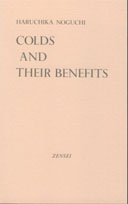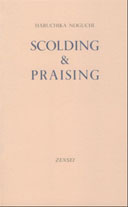|
|
|

 |
ORDER, SPONTANEITY AND THE BODY Human beings live by means of the extremely subtle, autonomous activities of life. Nevertheless, many people these days cannot bring themselves to realize this, and they suppose that they cannot maintain their health unless they rely on medicines and specialist techniques.
It is no exaggeration to say that, just as the regular use of synthetic hormones inhibits the body's own production of hormones, the tendency of modern people to rely excessively on medicines weakens those autonomous capacities that man naturally possesses.
The author believes that it is necessary to revitalize the autonomous capacities of the human body, and he recommends a method of training the extrapyramidal system which is known as “katsugen undo”, as well as doing “yuki”. In this book, the ways to practise these methods are explained in detail, and the book provides a useful introduction to living in a “seitai” way. |
| Noguchi Haruchika |
123pp. 5 black and white plates |
1,980Yen |
|



 |
COLDS AND THEIR BENEFITS The common cold is regarded as the root of all illness, or it is dismissed as being of no account. From the point of view of what is generally accepted, the title of this book may seem rather odd, but the author's position is that a cold is not something to be cured, but something to be “passed through.” When the biassed fatigue in a person's body and mind reaches the limit, that person will, by means of the autonomic workings of the body, catch a cold in order to regulate this fatigue.
The author does not regard a cold as a pathological condition, but as a natural means whereby health is maintained. He argues persuasively that if you do not disturb the natural process that is a cold, the body becomes renewed after a cold, rather like a snake that has sloughed its skin.
The author's very original concept of “passing through” an illness, which derives from his own understanding of natural processes, has the power to change our modern way of thinking concerning illness, which is that it should be fought against. |
| Noguchi Haruchika |
200pp. |
2,640Yen |
|



 |
SCOLDING AND PRAISING Giving a scolding and giving praise are both difficult arts. A parent's way of scolding is sometimes so unskillful that children mistake a scolding for an outburst of anger. And praise that doesn't hit the mark exactly is regarded by children as condescending gush.
With a scolding, though, if it is not a little off the mark, the child will resist: when a wound is touched directly, it is painful. But it is from such a wound that new energy arises, and so the parent has to judge precisely how deep the wound is in giving a scolding and avoid touching it directly; for if the mark is hit too exactly, an opening up of the child's sensibility is unlikely to occur. For both praising and scolding, discretion is needed.
This book explains the psychological and physiological make-up of the child. In addition to dealing with children's upbringing, it explains that parents should have the capacity to look at themselves. |
| Noguchi Haruchika |
240pp. |
2,750Yen |
|

|
|